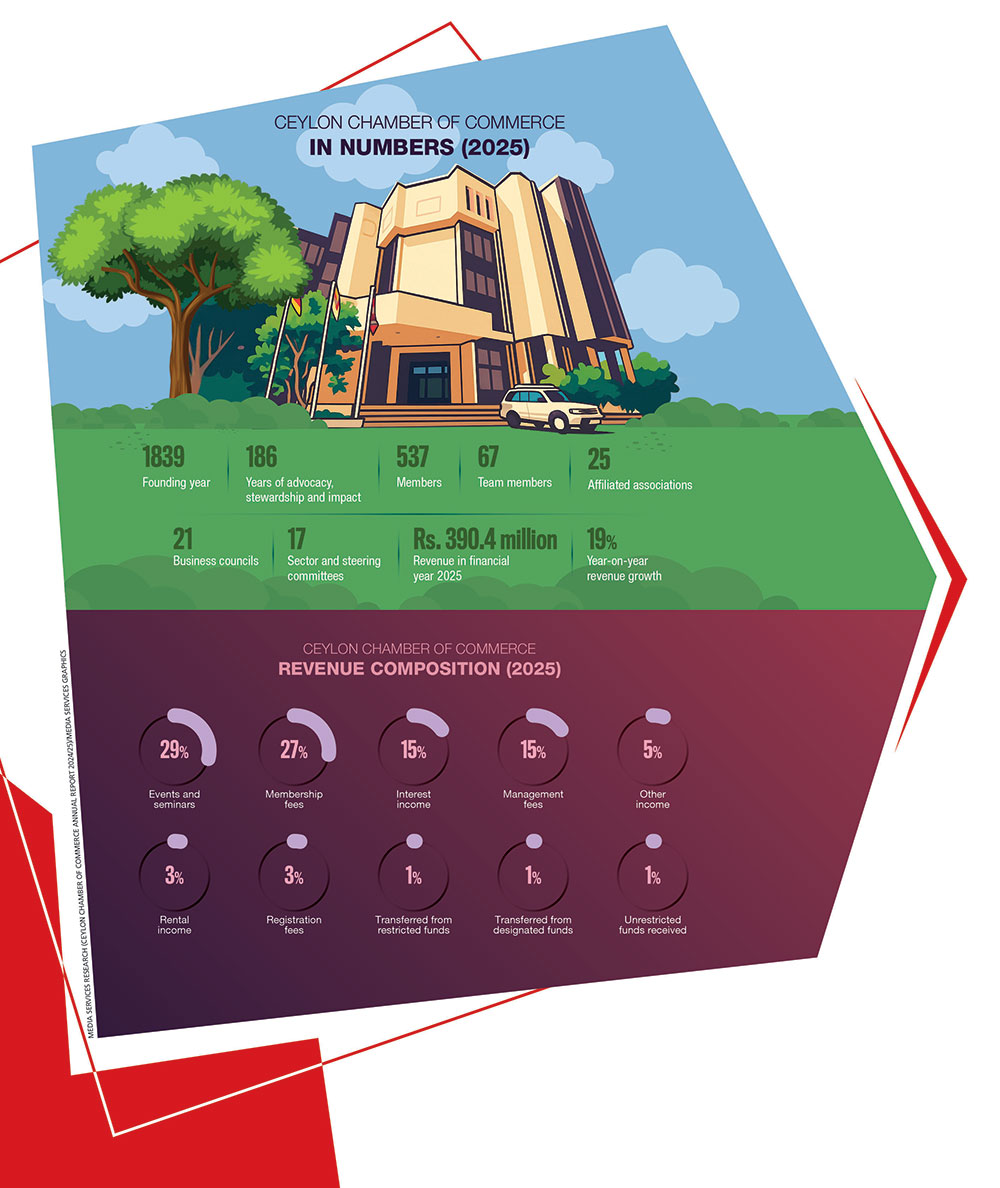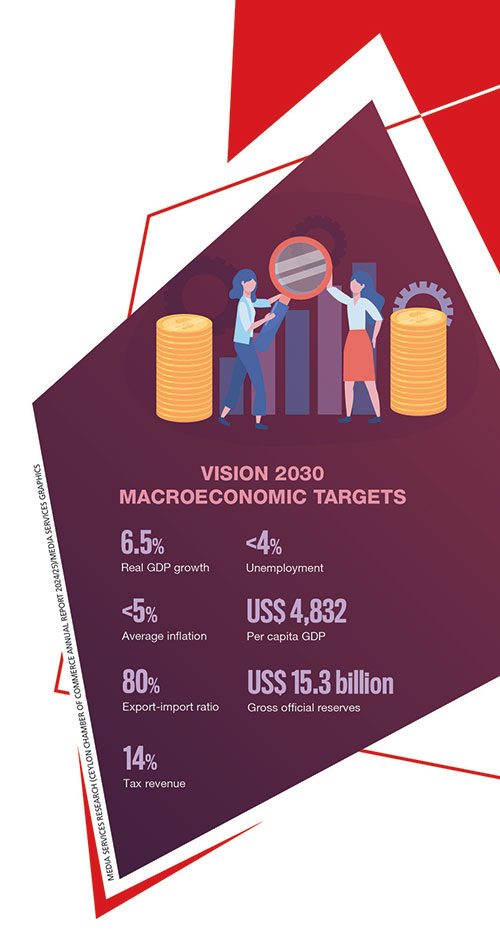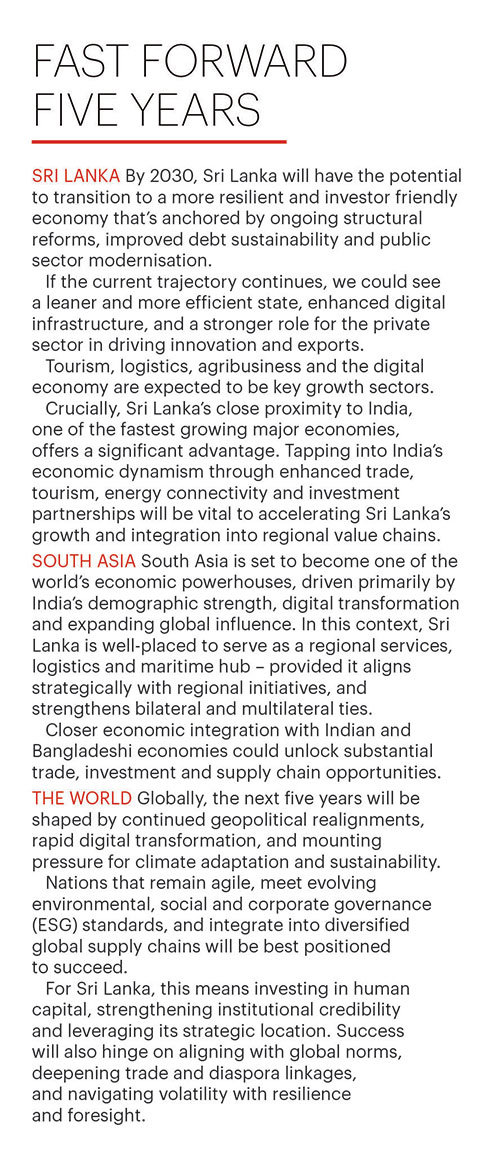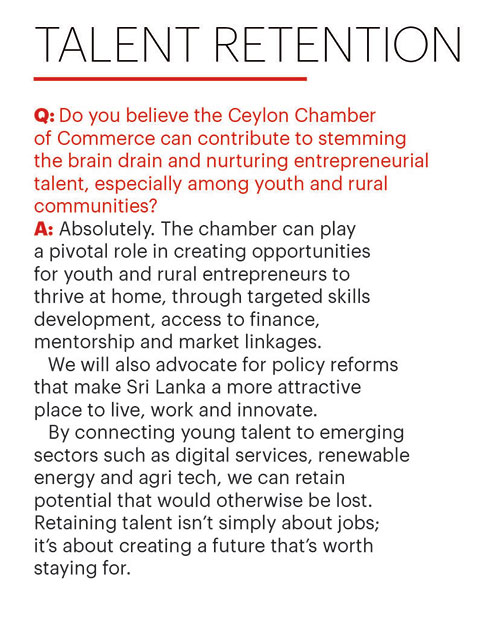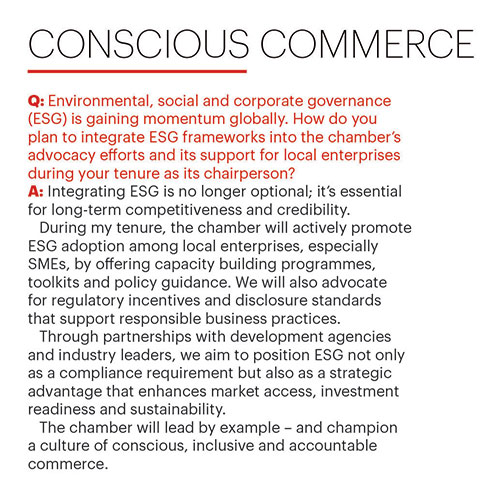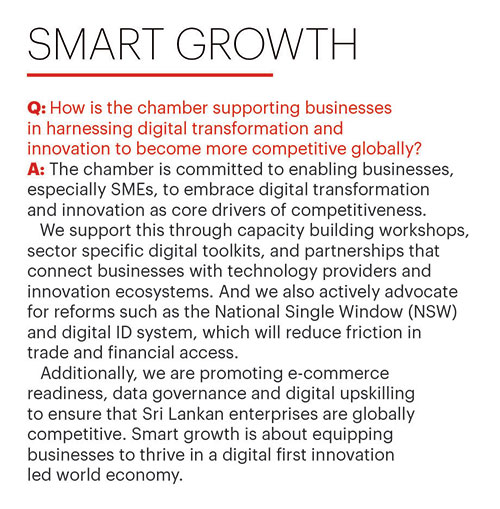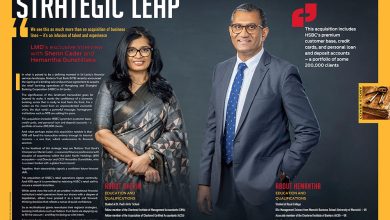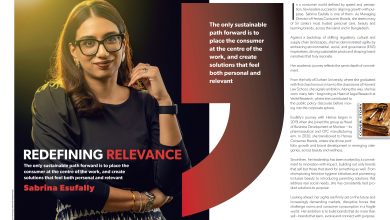
A Level Playing Field
The Ceylon Chamber of Commerce is committed to supporting a clean rules based economic environment that fosters fair competition and sustainable growth
Krishan Balendra

The recently elected Chairperson of the Ceylon Chamber of Commerce Krishan Balendra brings a wealth of leadership experience and strategic private sector perspectives to Sri Lanka’s premier business chamber.
As the Chairperson and CEO of John Keells Holdings (JKH) – the country’s largest listed conglomerate – Balendra has long been recognised as a dynamic and forward-looking corporate leader.
His appointment as chairperson marks a pivotal moment for the organisation as it seeks to champion reforms to embolden the economic recovery amid a challenging global and domestic environment.
A former student of Royal College, Balendra holds a law degree from the University of London and an MBA from the prestigious INSEAD in France. His election to the chamber’s top position is also symbolic, as he becomes the first second generation chairperson of the chamber, following in the footsteps of his father the late Deshamanya Ken Balendra.
This continuity underscores the deep-rooted ties between the chamber and corporate sector, as well as the organisation’s enduring role as the voice of the private sector.
As chairperson, Balendra has signalled a clear focus on championing structural reforms to ensure macroeconomic stability and attract investment. He has been vocal about the need for policy consistency and a conducive environment for businesses to thrive, highlighting the critical role of the private sector in national development.
Tourism, which is an industry with untold potential to bolster the nation’s foreign exchange earnings and foster job creation, is also expected to gain special attention under his stewardship.
With Balendra at the helm, the chamber is positioning itself to intensify efforts to facilitate trade, promote innovation and competitiveness, and strengthen Sri Lanka’s standing in the world economy.
– Compiled by Tamara Rebeira
“As chairperson, Balendra has signalled a clear focus on championing structural reforms to ensure macroeconomic stability and attract investment”

Q: As the unifying voice of the private sector since 1839, how do you plan to strengthen the chamber’s leverage in pushing for policy stability – especially amid regulatory uncertainty that affects commerce and investment?
A: The chamber’s enduring strength lies in its credibility, non-partisan position and wide-reaching membership that spans all key sectors of the economy. The focus will be on reinforcing this foundation to ensure that the chamber continues to be the leading, most influential and unifying voice of (or principal advocate for) the private sector.
We leverage our three strategic pillars: policy advocacy, stakeholder engagement and expanding market access, to drive consistent and structured dialogue with the government. The aim is to create a stable and consistent policy environment that encourages long-term investment and innovation.
Amid regulatory uncertainty, our role will be to provide constructive evidence based recommendations rooted in the national interest. We will continue to convene expert inputs across our sector and steering committees, and ensure that our advocacy is both timely and forward-looking.
The chamber will also work to hold policy makers accountable for reform delivery while ensuring that engagement is sustained beyond election cycles. Our goal is to build confidence through consistency and act as a catalyst for inclusive private sector led economic growth in Sri Lanka.
Q: The chamber’s ‘Vision 2030’ outlines clear targets for growth, social wellbeing and sustainability. How do you plan to pursue this road map during your tenure and which economic pillars will receive your immediate focus?
A: Vision 2030 provides a compelling framework to align private sector dynamism with national priorities that are anchored in growth, social wellbeing and sustainability. We are committed to advancing this road map with a results oriented focus on implementation, collaboration and accountability.
Immediate attention will be paid to deepening policy advocacy, particularly around structural reforms such as state-owned enterprise (SOE) restructuring, trade liberalisation and improving the investment climate – all essential for building resilience and investor confidence.
In parallel, accelerating digital transformation and enhancing export competitiveness will be central through initiatives such as the rollout of the digital ID system, implementation of the National Single Window (NSW) and modernisation of the Customs Ordinance. These reforms are low hanging fruit that can catalyse productivity, inclusion and trade efficiency.
We will also place greater emphasis on market access for SMEs, skills development and climate conscious growth, in alignment with our commitment to equitable and sustainable economic development.
The chamber will continue to act as a catalyst and convener, drawing on its diverse network of over 500 members, 21 business councils, 25 affiliated associations and 17 sectoral and steering committees, to ensure that Vision 2030 becomes a lived national reality and not simply a plan on paper.
“To attract FDIs we will work closely with the government to streamline land access, improve regulatory clarity and build confidence in policy stability”
Q: Ten years ago, the chamber advocated a set of 10 principles to accelerate growth – including market orientation, export competitiveness, foreign direct investment (FDI) and SME development among others. How can these principles translate into active campaigns under your leadership?
A: The 10 principles remain more relevant than ever today. Building on these principles, we will launch targeted action oriented campaigns that reflect today’s realities and tomorrow’s opportunities.
For instance, the push for market orientation and export competitiveness will be advanced through practical trade reforms such as phasing out para-tariffs, developing a modern trade policy and fast tracking digital trade facilitation tools such as the NSW. These efforts will improve ease of trade and open new markets for Sri Lankan businesses.
To attract FDIs we will work closely with the government to streamline land access, improve regulatory clarity and build confidence in policy stability – all of which are crucial to rebuilding investor sentiment.
On SME development, we will scale up capacity building programmes, expand access to finance and export channels, and foster public-private partnerships (PPPs), to unlock the potential of regional and youth led enterprises.
These principles won’t remain abstract ideals; they will be the foundation of our campaigns for inclusive growth, global competitiveness and private sector led transformation that aligns with the chamber’s Vision 2030.
Q: How will the institution you now lead, engage with the government to ensure a rapid rollout of the digital ID system and National Single Window – reforms you’ve flagged as transformative for financial inclusion and trade efficiency?
A: The digital ID system and NSW are foundational reforms that can transform how citizens access services and how businesses engage in trade. The chamber strongly supports both initiatives, as they directly enhance financial inclusion, governance and trade competitiveness.
It will engage the government in a structured, nonpartisan and persistent manner, advocating for clear implementation timelines and cross agency coordination. Through our regular policy dialogues, technical working groups and strategic submissions, we will keep these reforms at the forefront of the national agenda.
We also recognise the value of private sector readiness. As such, the chamber will work in parallel to build awareness and capability among businesses, particularly SMEs, to adopt and benefit from these digital platforms.
Crucially, we will collaborate with multilateral partners, regulatory bodies and line ministries to monitor progress and resolve bottlenecks by ensuring that these reforms move from concept to execution at speed. By maintaining momentum beyond changes in government leadership, the chamber will be a steady force in seeing these long-awaited reforms finally delivered.
“By maintaining momentum beyond changes in government leadership, the chamber will be a steady force in seeing these long-awaited reforms finally delivered”
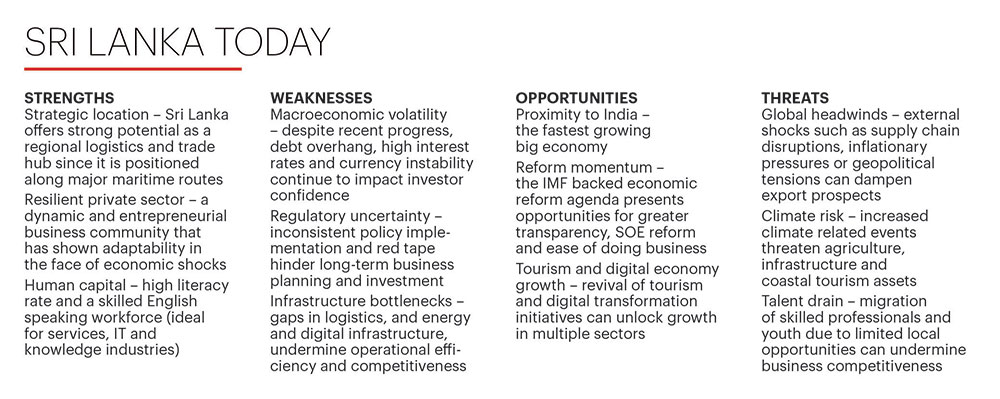
Q: So how will you ensure that the chamber’s engagement with the government is sustained and not tied to election cycles – in order to keep reform agendas on track in the aftermath of elections?
A: One of the chamber’s greatest strengths is its institutional continuity and nonpartisan character. This gives it the ability to engage constructively with any government, regardless of political transitions, on issues that matter to the long-term health of the economy.

To ensure that our engagement is sustained beyond changes in government, we will strengthen our evidence based policy advocacy that’s backed by data, research and broad stakeholder consensus. We will continue to maintain structured dialogues with both policy makers and technocrats, to keep the reform momentum alive during and after political transitions.
Importantly, we will focus on building cross party consensus around core economic reforms such as digital transformation, trade facilitation and SOE restructuring, so that these agendas are seen as national imperatives and not political talking points.
In addition, we will keep our membership, and sectoral and steering committees, deeply engaged in shaping and following up on reform initiatives. This grassroots momentum from the private sector helps hold successive administrations accountable and ensures continuity, irrespective of the political cycle.
“We will focus on building cross party consensus around core economic reforms such as digital transformation, trade facilitation and SOE restructuring”
Q: With Sri Lanka entering a critical narrow but vital window for reform, what immediate action would you recommend to prevent reform fatigue?
A: Sri Lanka now has a narrow but vital three year window of reduced external debt repayments. This must be used decisively to fast track reforms that have long been identified but repeatedly delayed.
To prevent fatigue, we need to shift from rhetoric to delivery. The most immediate action is to prioritise and implement low hanging reforms, those that are widely agreed upon, technically feasible and capable of delivering quick wins. These include rolling out the digital ID system, implementing the NSW, updating the Customs Ordinance and executing the National Tourism Destination Marketing Plan.
In parallel, we must put in place robust implementation mechanisms with clearly assigned ownership, measurable timelines and transparent reporting. The chamber will do its part by maintaining policy pressure, providing technical input and ensuring consistent monitoring of progress. Reform momentum must be protected from short-term political pressure.
We will also work to mobilise private sector support to help sustain this effort, especially as economic fatigue can quickly turn into political hesitancy. In summary, urgency, focus and accountability must define the reform window – there will be no second chance.

“Sri Lanka now has a narrow but vital three year window of reduced external debt repayments. This must be used decisively to fast track reforms that have long been identified but repeatedly delayed”
Q: There is now a renewed focus on addressing the spread of bribery and corruption in this country. Given its wide reach and influence, what steps is the chamber taking to help reduce our vulnerability to this menace?
A: Corruption undermines investor confidence, weakens institutions, and disproportionately affects SMEs and vulnerable communities. As the voice of the private sector, the chamber is committed to supporting a clean rules based economic environment that fosters fair competition and sustainable growth.
We will continue to advocate for greater transparency and accountability in public procurement, SOE governance and regulatory enforcement. Our engagement with the government includes calling for reforms that reduce discretion, digitise processes and streamline approvals – key measures that directly shrink the space for corrupt practices.
The chamber is also strengthening its work on business ethics and governance standards, encouraging our members – especially larger corporates and multinationals – to lead by example and cascade integrity practices across their supply chains.
We recognise that addressing corruption requires collective action. That is why we will work with civil society, development partners and the media, to promote transparency, support institutional reform and reinforce Sri Lanka’s international commitments to anticorruption frameworks.
A cleaner business environment is not only a moral imperative; it is an economic necessity.

“We will also advocate for policy reforms that make Sri Lanka a more attractive place to live, work and innovate”
Q: Likewise, steps are being taken to widen the tax net and address evasion – especially among the wealthy. What more can the chambers of commerce and industry do to help bridge this gap?
A: A fair and efficient tax system is essential for macroeconomic stability and public trust. The chamber supports government efforts to broaden the tax base and reduce evasion, especially in segments where compliance has historically been weak.
To bridge this gap, the chambers of commerce and industry can play a vital role in shaping tax policy that is equitable, transparent and growth oriented. We will continue to advocate for data driven reform, simplified compliance processes, and better use of digital tools to enhance traceability and enforcement.
At the same time, the chamber will support tax literacy and awareness initiatives, particularly among SMEs and informal businesses, to foster a stronger culture of voluntary compliance.
We also urge consistency and fairness in enforcement, closing loopholes while ensuring that legitimate businesses aren’t burdened disproportionately. This balance is critical to securing public buy-in and avoiding reform fatigue.
Building trust in the tax system through transparency, service efficiency and stakeholder engagement will be key to mobilising sustainable domestic revenue without discouraging entrepreneurship.
“A cleaner business environment is not only a moral imperative; it is an economic necessity”

Q: SME resilience is a core strategic priority – over 400 SMEs have reportedly benefitted from the chamber’s training programmes. What is likely to be your flagship initiative to increase their access to finance, skills and export channels?
A: Small and medium-sized enterprises are the backbone of Sri Lanka’s economy, and strengthening their resilience is central to achieving inclusive and sustained growth. Building on the chamber’s strong foundation of capacity building initiatives, my focus will be to scale up practical outcome driven support for SMEs in three key areas: finance, skills and export readiness.
Our flagship initiative will be the launch of a national SME competitiveness programme that brings together financial institutions, export agencies, digital platforms and donor partners to create an integrated support ecosystem. This will include tailored credit schemes, technical advisory services, digital onboarding and mentoring for product and market diversification.
We will also expand access to regional training and certification programmes with a special focus on women led and youth driven enterprises, and link high performing SMEs to global buyers through our business councils and trade missions.
Additionally, we will advocate for policy level reforms such as factoring, digital ID linked credit scoring and e-commerce regulations that can lower entry barriers for SMEs to participate in the formal economy and export markets.
Our goal is not simply to train SMEs but transform them into becoming competitive, investment ready players in domestic and global value chains. Beginning in 2025, the chamber’s annual flagship event on SMEs titled the ‘National SME Forum’ will serve as a national platform to showcase and deepen our ongoing engagement with the SME sector.
Q: The chamber has advocated for structural reforms such as SOE restructuring, trade liberalisation and an improved investment climate. How will you hold policy makers accountable to deliver within a measurable timeframe?
A: Structural reforms such as SOE restructuring, trade liberalisation and investment climate improvement are not optional; they are essential to repositioning Sri Lanka on a sustainable growth path. The chamber is committed to ensuring that these reforms move from policy intent to implementation with clear benchmarks and accountability.
We will do this by publishing periodic policy scorecards, tracking progress against announced reform timelines and highlighting gaps where delivery is lagging. These will be based on input from our 17 sectoral and steering committees, and reinforced through dialogue with policy makers, the media and the public.
Additionally, we will push for reforms to be embedded in medium-term national frameworks, not only budget speeches or manifestos, so that continuity survives political transitions. The chamber will also advocate for independent oversight mechanisms, particularly for large-scale SOE reforms and trade agreements, to ensure transparency and public accountability.
Our engagement will remain constructive but firm. Sri Lanka simply can’t afford another cycle of delayed reforms. As the private sector, we have a responsibility to keep the focus on execution – and we will rise to that task.
“During my tenure, the chamber will actively promote ESG adoption among local enterprises”
Q: You bring private sector experience to the chamber. How will you rally corporates and SMEs to collaborate actively in national reforms and inclusive growth?
A: With extensive experience in the private sector, I recognise the significant responsibility that businesses carry in shaping national outcomes. I’m committed to harnessing the collective strength of corporates, SMEs and regional enterprises, to drive meaningful reform and inclusive growth.
We will focus on creating structured platforms for collaboration where large companies can share expertise, technology and market access with SMEs and startups. Through sectoral partnerships, innovation forums and digital linkages, we can build value chains that aren’t only competitive but also inclusive.
Moreover, we will also promote business led solutions to national challenges, whether it’s supporting climate resilience, improving youth employability or enabling digital transformation; and we’ll ensure that these initiatives are embedded within the broader reform dialogue with the government.
Importantly, we will encourage companies to go beyond compliance and contribute to nation building – not as a CSR obligation but a strategic imperative.
The chamber will act as a trusted convener to help forge these partnerships and align them with policy priorities. The private sector must show unity, purpose and leadership if Sri Lanka is to unlock its true potential – and that’s what I aim to foster during my tenure.


“We also actively advocate for reforms such as the National Single Window (NSW) and digital ID system, which will reduce friction in trade and financial access”
Q: As the first father-son duo to lead the chamber – following in the footsteps of your late father Deshamanya Ken Balendra (1998-2000), how has this legacy shaped your approach to leadership? And in what ways do you hope to chart a different course?
A: It is an honour to follow in the footsteps of my late father, who served in this same position. His leadership was marked by vision, integrity and a deep commitment to national progress – values that I carry with me today.
This legacy has shaped my approach in several ways. It reminds me that leadership is ultimately about service, about using your voice and position to uplift others, and to contribute meaningfully to your country.
It also instils in me a strong sense of stewardship to protect and strengthen the institutions that generations have built.
At the same time, I recognise that we are in a very different era. The scale and complexity of today’s challenges – from digital disruptions to global economic realignment – demand fresh thinking and new tools.
While I draw strength from the past, I aim to chart a forward-looking course – one that emphasises technology, inclusion, sustainability and global competitiveness. My focus will be on execution, unlocking results, and building coalitions across sectors and generations to drive meaningful reform.



